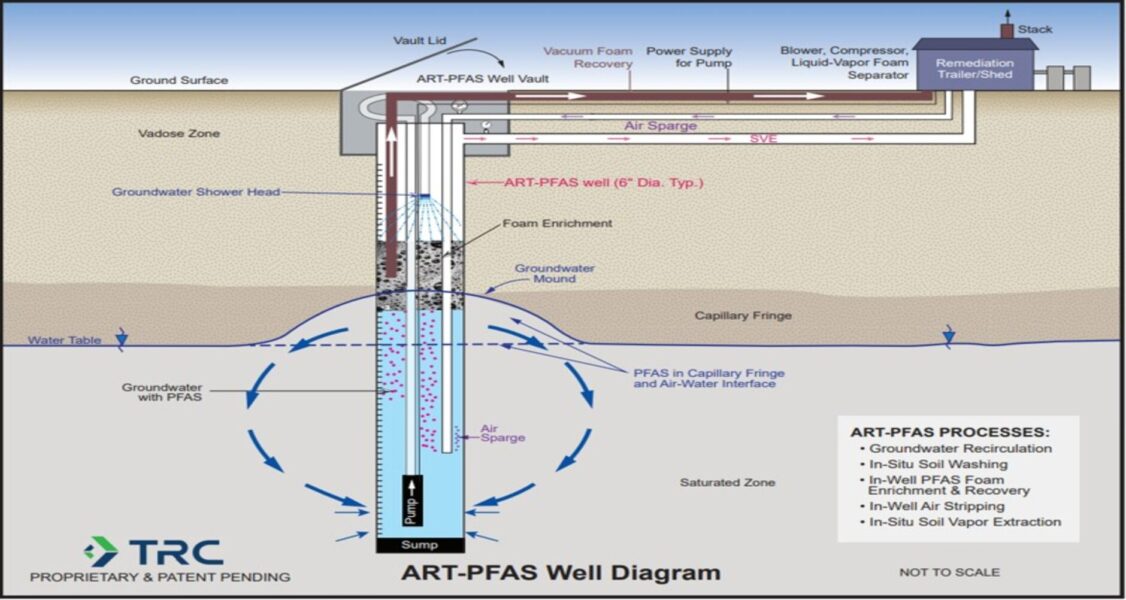Don’t miss TRC’s presentation and workshop at the 40th Annual AEHS International Conference on Soils, Sediments, Water and Energy
On October 21, 2024, as part of the AEHS East Conference, TRC’s Senior Vice President Dr. Nidal Rabah will present the first successful field application of the innovative Accelerated Remediation Technologies, Inc. for per- and polyfluoroalkyl substances (ART-PFAS) technology at a former industrial site in New Jersey to address PFAS in groundwater. This remedial approach is a game changer and a paradigm shift as the remediation industry strives to tackle the ever-growing PFAS problem. Between 2019 and 2023, TRC co-developed the ART-PFAS¹ active in-situ remediation technology for PFAS. This technology greatly diverges from conventional pump-and-treat (P&T) or passive adsorption processes that have been the industry’s default strategies.
Related Services

Reducing PFAS Concentrations Successfully
ART-PFAS is a specialized accelerated system designed to remove PFAS via in-situ groundwater circulation and foam fractionation/stripping and recovery. The conventional ART system was developed and successfully used at numerous sites to remediate volatile organic compound (VOC) contamination in soil and groundwater. The technology integrates proven synergistic in-situ remediation processes including groundwater circulation, soil washing, volatilization and in-well stripping via soil vapor extraction and air sparging (SVE/AS). For ART-PFAS, in-well air sparging is used to generate PFAS-rich foam that can be recovered with condensate via SVE. Groundwater circulation augments performance and enhances PFAS partitioning and soil washing across the water table and capillary fringe.
The ART-PFAS technology is adaptable for in-situ source zone control and plume remediation and management, especially for co-mingled plumes of PFAS and VOCs, and highly variable mass flux zones. ART-PFAS is highly flexible for repurposing of or integration into existing SVE/AS system infrastructure and minimizing the management of PFAS-impacted media above ground.
The results demonstrated that within a few months of operation, PFAS concentrations were reduced by 50%-100% in the test well and 25%-40% in a monitoring well. Perfluorooctane sulfonic acid (PFOS) and perfluorooctanoic acid (PFOA) concentrations in the test well were reduced from 1,000 and 400 ng/L, respectively, to below New Jersey and USEPA maximum contaminant levels (MCLs) for drinking water. PFAS concentrations within the recovered foam/condensate were enriched by 100 to 300 times baseline water concentrations. The volume of water/waste generated for aboveground management was de minimis and orders of magnitude less compared to P&T with only 50 gallons of foam/condensate recovered after circulating 500,000 gallons of groundwater.
Studying the Latest in PFAS Technology
TRC integrates our industry-leading expertise in characterization, remediation, toxicology, forensics, regulations and strategic planning to deliver practical and creative solutions for mitigating the business and environmental risks related to per- and polyfluoroalkyl substances (PFAS) and other emerging contaminants. TRC’s Center of Research and Expertise (CORE) is a multidisciplinary team of experts whose mission is to promote technical excellence, work at the forefront of emerging contaminants and issues focusing on solutions, and contribute to the technical advancement of our professional, client and academic communities.
AEHS’ Annual Conference on Soils, Sediments, Water, and Energy is the nation’s foremost environmental conference that brings together professionals from diverse backgrounds.



